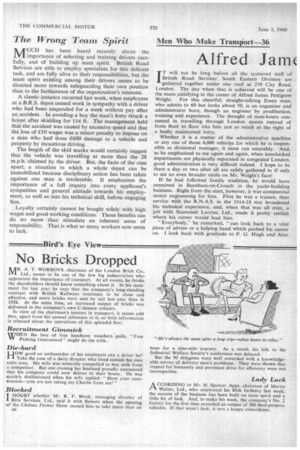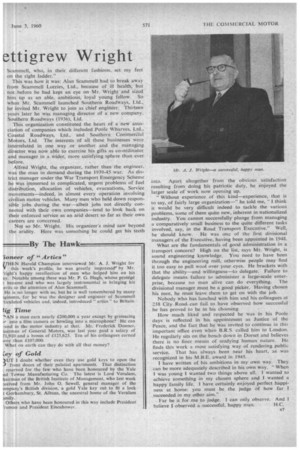No Bricks Dropped
Page 40

Page 41

If you've noticed an error in this article please click here to report it so we can fix it.
MR. A. T. WORBOYS, chairman of the London Brick Co., Ltd., seems to be one of the few big industrialists who appreciate the importance of transport. At all events, he thinks the shareholders should know something about it. In his statement for last year he says that the company's long-standing contract with British Railways continues to be close and effective, and more bricks were sent, by rail last year than in 1958. At the same time, an increased output of bricks was delivered in the company's own C-licence vehicles.
In view of the chairman's interest in transport, it seems odd that, apart from his annual reference to it, so little information is released about the operations of this splendid fleet.
Recruitment Gimmick
wHEN the lure of free luncheon vouchers palls, "Free Parking Guaranteed might do the trick. Die-hard H"good an ambassador of his employers can a driver be? Take the case of a dairy director who lived outside his own sales area. His wife was naturally compelled to buy milk from a competitor. But one evening her husband proudly announced that his company could now deliver to their house. He was quickly disillusioned when his wife replied: "Blow your commission—you are not taking my Charlie from me!"
Blocked
T DOUBT whether Mr. R. F. Block, managing director of Blox Services, Ltd., said it with flowers when the opening of the Chelsea Flower Show caused him to take more than an' B6 hour for a nine-mile 'journey. As a result, his talk to the Industrial Welfare Society's conference was delayed.
But the 90 delegates were well rewarded with a knowledgeable survey of delivery men's problems. They were shown that respect for humanity and persistent drive for efficiency were not incompatible.
Lady Luck
A CCORDING to Mr. H. Spencer Apps, chairman of Martin PA Walter, Ltd., who celebrated his 80th birthday fast week, the success of the business has been built on team spirit and a little bit of luck. And, to make his week, the company's No. 2 factory for the first time exceeded an output of 300 dual-purpose vehicles. If that wasn't luck, it was a happy coincidence. By The Hawk__ 'ioneer of " Artics" //HEN Harold Champion interviewed Mr. A. J. Wright for V this week's profile, he was greatly impressed' by Mr. 'right's happy recollection of men who helped him on his ay. Notable among these was Mr. P. G. Hugh, whose protégé : became and who was largely instrumental in bringing his erits to the attention of Alan Scammell.
He is no longer with us, but he is well remembered by many Igineers, for he was the designer and engineer of Scammell liculated vehicles and, indeed, introduced " artics " to Britain.
rig Time AN a man earn nearly £200,000 a year except by grimacing into a film camera or howling into a microphone? He can -and in the motor industry at that. Mr. Frederick Donner, lairman of General Motors, was last year paid a salary of 71,910 and a bonus of £125,625. Ten of his colleagues earned lore than £.107.000.
What on earth can they do with all that money?
iey of Gold )UT I doubt whether even they use gold keys to open the front doors of their palatial apartments. That distinction reserved for the few who have been honoured by the Yale nd Towne Manufacturing Co. The latest is Lord Verularn. hairman of the British Institute of Management, who last week ceived from Mr. John 0. Sewell, general manager of the ompany's British division, a gold Yale key cut to fit a lock t Gorhambury, St. Albans, the ancestral home of the Verulam Others who have been honoured in this way include President 'ruman and President Eisenhower.
into. Apart altogether from the obvious satisfaction resulting from doing his patriotic duty, he enjoyed the larger scale of work now opening up.
"Without experience of this kind—experience, that is to say, of fairly large organization—" he told me, "I think it would be very difficult indeed to tackle the various problems, some of them quite new, inherent in nationalized industry. You cannot successfully plunge from managing a comparatively small business to the quite different tasks involved, say, in the Road Transport Executive." Well, he should know. He was one of the first divisional managers of the Executive, having been appointed in 1948.
What are the fundamentals of good administration in a transport concern? High on the list, says Mr. Wright, is sound engineering knowledge. You need to have been through the engineering mill, otherwise people may find it too easy to pull wool over your eyes. He brackets with that the ability—and willingness—to delegate. Failure to delegate means failure to administer a large-scale enterprise, because no man alive can do everything. The divisional manager must be a good picker. Having chosen his men, he must leave them to get on with the job.
Nobody who has lunched with him and his colleagues at 238 City Roadcan fail to have observed how successful he has proved to be in his choosing
How much liked and respected he was in his Poole days is reflected in his appointment as Justice of the Peace, and the fact that he was invited to continue in this important office even when B.R.S. called him to London. He regularly sits on the bench down in Dorset and believes there is no finer, means of studying human nature. He finds this work a most satisfying way of rendering public service. That has always been near his heart, as was recognized in his M.B.E. award in 1945.
I have written of his ambitions in my own way. They can be more adequately described in his own way. "When I was young I wanted two things above all. I wanted to achieve something in my chosen sphere and I wanted a happy family life, I have certainly enjoyed perfect happiness at home: you must be the judge of how far I succeeded in my other aim."
Far be it for me to judge. I can only observe. And I believe I observed a successful, happy man. H.C.
















































































































